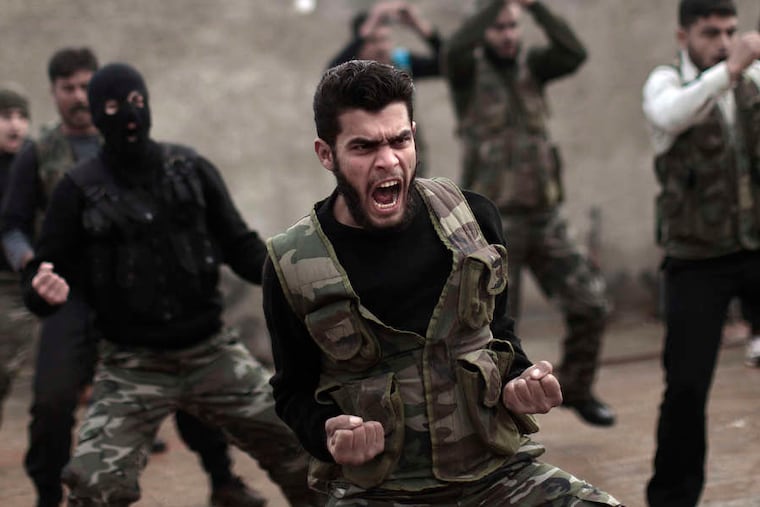Will trumps skill for rebels
A ragtag group in Syria is working hard to become a fighting force.

MAARET IKHWAN, Syria - Sixteen grunting rebel fighters dropped down for pushups in a rain-slick backyard, practiced storming a house from the cover of an olive grove, and then assembled for a refresher course on firing rocket-propelled grenades.
Their instructor, a former Syrian commando, said his young trainees still had a lot to learn but that their drive to topple President Bashar al-Assad already makes them better soldiers than the regime's conscripts.
"Our faith in our cause outweighs our shortcomings," said the instructor, who defected from the Syrian army in February and gave his name as Abu Hamza to protect his relatives.
Monday's training, in a rural area of Syria's largely rebel-controlled northwestern Idlib province, is part of a widening attempt to transform ragtag rebel groups into a disciplined fighting force.
Earlier this month, more than 500 commanders of rebel units, meeting in Turkey, elected what is to be a unified command, headed by a new chief of staff, defected Syrian Gen. Salim Idries, and a 30-member group of senior officers.
Wider support
Syria's opposition hopes the new military command will bring needed international support for fighters. The West is unlikely to send weapons, for fear they will fall into the hands of extremists, but Syrian opposition leaders hope a unified command can become a conduit for logistical support.
For now, local rebel groups still operate with considerable autonomy, despite attempts in recent months to establish provincial military councils.
Monday's training was part of an attempt by the Idlib branch of the Tawheed (Unity) Brigade to improve the skills of its fighters. In Idlib, the brigade is made up of seven battalions with about 900 armed men, said the instructor, Abu Hamza, once a special forces commander who served 12 years in the Syrian military.
Abu Hamza, 32, said that for the last month, he has been moving among rebel outposts to train the fighters. He said he hoped to pick the best for a future rebel commando unit.
'This is better'
Just months ago, most of the trainees had held ordinary jobs as farmers or laborers, and now appeared to be relishing the excitement and camaraderie of rebel life.
"This is better," Ahmed Najar, 22, said of being a rebel, when asked to compare his life now with his days as an aluminum worker. "This is jihad. This gets us into paradise."
Najar joined five months ago, saying he could not stand aside as the regime stepped up attacks on Syrian civilians.
The uprising began in March 2011, first with peaceful protests, but became a civil war in response to a violent crackdown.
Abu Hamza said that as a career soldier, he could not have imagined he would one day be asked to fire on unarmed Syrians. He said he got in trouble with his commanders when he refused to shoot at demonstrators, finally ending up in a military prison in January. He was released after two months, returned to his home province of Idlib and joined the rebels.
Now he is passing on what he learned.